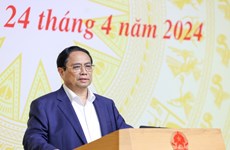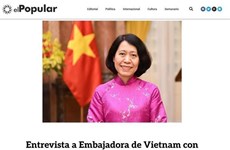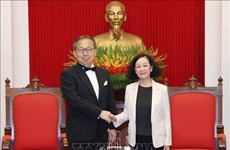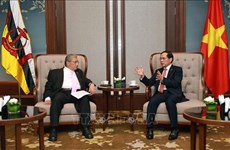Vietnam, Japan look to make intensive strategic partnership more practical
Vietnam and Japan need to ceaselessly promote cooperation, thus making their intensive strategic partnership for peace and prosperity in Asia more practical, towards shaping a new strategic partnership model in the East Asia-Pacific region.
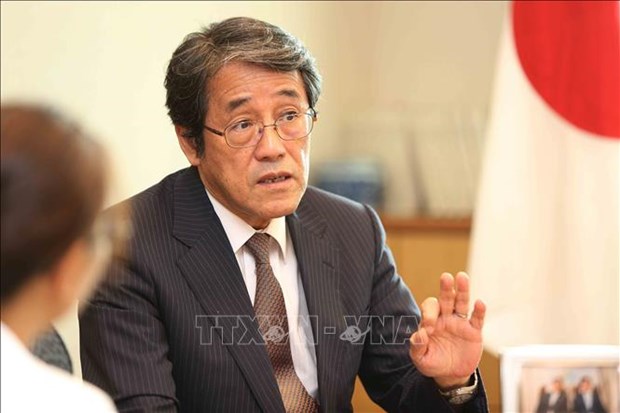 Japanese Ambassador to Vietnam Kunio Umeda (Source: VNA)
Japanese Ambassador to Vietnam Kunio Umeda (Source: VNA)Hanoi (VNA) – Vietnam and Japan need to ceaselessly promote cooperation, thus making their intensive strategic partnership for peace and prosperity in Asia more practical, towards shaping a new strategic partnership model in the East Asia-Pacific region.
Prof. Nguyen Xuan Thang – who holds the positions of Secretary of the Party Central Committee (PCC), Director of the Ho Chi Minh National Academy of Politics, Vice Chairman of the PCC’s Theoretical Council and Chairman of the Party Central Theoretical Council – made the suggestion at an international symposium themed “Vietnam-Japan Relations development: History and Prospects” in Hanoi on September 21.
Thang said that the promotion of bilateral relations should be done based on the solid consolidation of strategic trust, comprehensive cooperation, and responsibility-sharing for regional and global issues.
He emphasised that the two countries should continue to improve the efficiency of their economic cooperation in line with the trends of regional integration enhancement and the rapid evolution of the Fourth Industrial Revolution.
Japan and Vietnam ought to play a leading role in accelerating the realisation of the Comprehensive and Progressive Agreement for Trans-Pacific Partnership (CPTPP), and actively coordinate in negotiating the Regional Comprehensive Economic Partnership (RCEP), as well as join hands in creating and connecting a free and open Indo-Pacific region, he said.
The two countries should take the initiative in promoting overall connection between their governments, localities, enterprises, and sectors, especially in fields with high productivity, quality, efficiency, and those using high technology, Thang noted.
Vietnam's supporting industries ought to be connected to global production networks, especially those led by Japanese technology groups, he added.
Thang underlined the need for the two sides to foster efforts to achieve the goal of doubling their 2014 trade and investment turnover by 2020.
The two sides should also expand practical and effective defence and security collaboration – especially in maritime safety – and jointly deal with non-traditional security issues – such as cyber security and global climate change, which are major challenges for the development of humanity, he said.
In the context of the Fourth Industrial Revolution, Vietnam needs to enlist technological support provided by the Japanese side in order to develop new sectors such as high-tech agriculture, industries and services; and learn from Japan’s experience in building a 5.0 social model, Thang said.
He suggested the two sides enhance links in education-training and people-to-people exchange to deepen comprehensive relations between the two nations in the future.
Addressing the event, Japanese Ambassador to Vietnam Kunio Umeda stressed that the bilateral relations are now at their best point, adding that the ties are based on mutual trust as the two countries share many strategic interests.
He also underlined the necessity for the two sides to further bolster their ties in the context of great changes in the world’s order.
Participants said the friendship between Vietnam and Japan has been ceaselessly developed, opening new and effective cooperation frameworks.
The two sides have upgraded their relations to the intensive strategic partnership for peace and prosperity in Asia.
Over the last 45 years, the Japan-Vietnam friendship has been constantly developing, in which economic cooperation has always been a top priority and a great success for the two countries' relations.
The two-way trade reached over 33.84 billion USD in 2017. This hit 8.7 billion in the first quarter of 2018, up nearly 16 percent over the same period last year.
Japan is Vietnam's fourth largest trade partner. The country’s investment in Vietnam in 2017 reached a record of 9.1 billion USD. By the end of the first quarter of 2018, Japan had nearly 3,700 investment projects in Vietnam with a total registered capital of nearly 50 billion USD.
At present, more than 2,500 Japanese enterprises are operating in Vietnam, including most of the country’s major corporations. Japan was also the first G7 country to recognise Vietnam's market.
Cultural and people-to-people exchanges between the two countries are continuously promoted under many formats. The number of Vietnamese students and trainees in Japan, as well as those of Japanese students pursuing their studies in Vietnam, has increased rapidly in recent years.
Regarding defence and security bonds, the two countries also achieved remarkable cooperation results in preventing transnational crime and ensuring safety and security at sea. –VNA







